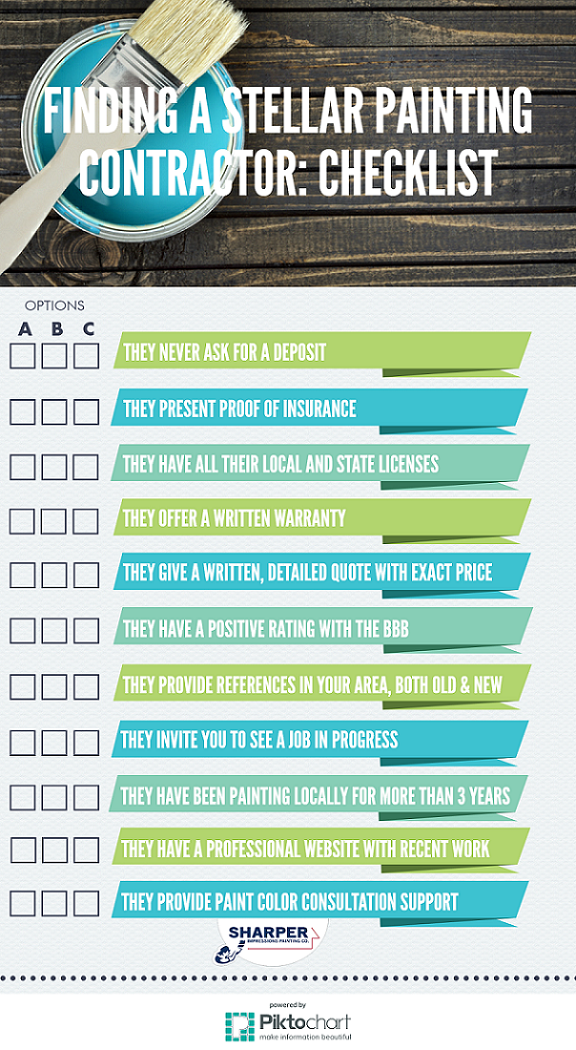Have You Ever Doubted Why Your Painting Job Really Did Not Satisfy Your Assumptions? Uncover The Regular Errors That May Be Threatening Your Outcomes
Have You Ever Doubted Why Your Painting Job Really Did Not Satisfy Your Assumptions? Uncover The Regular Errors That May Be Threatening Your Outcomes
Blog Article
Short Article Writer-Greene Hopkins
When you're planning to repaint your wall surfaces, it's easy to forget some crucial information that can make or damage your job. You may think picking any type of paint will certainly do, or that surface area preparation isn't needed, however these choices can bring about irritating results. You'll wish to stay clear of common pitfalls like overloading your brush or rushing the drying out time between layers. Recognizing these blunders can save you effort and time, however there's even more to think about if you want a remarkable coating that lasts. Allow's discover what you could be missing out on.
Selecting the Incorrect Paint
Picking the appropriate paint is important for accomplishing a smooth, professional surface on your wall surfaces. If you select the wrong type, you'll promptly find yourself facing problems like peeling off, fading, or unequal color.
Beginning by taking into consideration the paint's base. Water-based paints are excellent for very easy cleanup and quick drying, while oil-based alternatives are ideal for durability in high-traffic areas.
Next, consider the coating. Matte coatings conceal imperfections well but can be hard to clean. Satin or eggshell coatings provide a balance in between aesthetic appeals and washability, making them ideal for many rooms.
For locations susceptible to moisture, like bathroom and kitchens, choose a semi-gloss or gloss paint, which stands up to mold and mildew and mold.
Do not fail to remember to examine the shade. Examination examples on your walls to see exactly how they search in various lights throughout the day. Illumination can considerably change just how a shade appears, so this step is vital.
Missing Surface Area Preparation
One of the largest mistakes house owners make is missing surface preparation before painting. You might think you can just grab a brush and begin, but that'll result in a less-than-stellar surface. Appropriate preparation is important for a smooth and long lasting result.
First, assess your walls for any type of imperfections like splits, holes, or peeling paint. Loading click over here now with spackle or caulk makes sure a consistent surface area.
Don't neglect to sand the area once it's dry, as this creates a much better surface area for the paint to comply with.
Next, clean your walls to get rid of dust, oil, and grime. A straightforward mix of soap and water can do wonders. If your walls are especially filthy, consider utilizing a degreaser.
Lastly, applying a primer is typically neglected however can dramatically enhance the outcome, particularly if you're repainting over a darker shade or a surface area that's been formerly repainted.
An excellent primer boosts bond and helps cover any type of spots.
Improper Application Methods
Applying paint with the incorrect techniques can result in uneven insurance coverage and a frustrating surface. One common mistake is utilizing the incorrect type of brush or roller. See to it you pick a tool that matches the paint kind and the surface structure. For smooth walls, a fine-nap roller works best, while distinctive surface areas might need a thicker nap.
One more concern is applying too much paint simultaneously. Rather, use thin, even coats. This not just protects against drips yet additionally ensures much better bond. If https://www.express.co.uk/life-style/property/1718584/Interior-design-paint-dark-colours-mistakes-avoid discover runs, do not panic-- simply take a brush and smooth them out quickly.
Also, bear in mind to maintain a damp side. This suggests overlapping your strokes while the paint is still wet to avoid noticeable lines.
Ultimately, prevent painting in straight sunlight or high moisture, as this can create the paint to dry too rapidly, leading to blistering.
Conclusion
To sum it up, preventing usual painting blunders can make a substantial difference in your project's outcome. Constantly choose the right paint for the job, never skip crucial surface area preparation, and utilize correct application methods to make certain a smooth surface. Take your time between layers and do not overload your brushes or rollers. By following these suggestions, you'll accomplish a professional-looking result that you can be pleased with in your home. Delighted painting!
